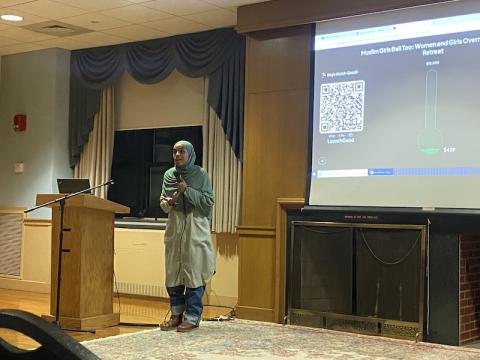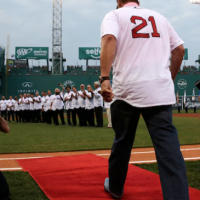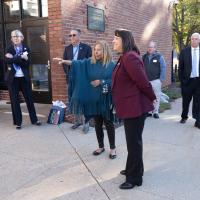
Trailblazing Athlete Bilqis Abdul-Qaadir Inspires Westfield State Community

Pioneering athlete and activist Bilqis Abdul-Qaadir spoke at Westfield State University on February 7 about her inspiring experience as the first Muslim woman to play NCAA Division I basketball while wearing a hijab.
Pioneering athlete and activist Bilqis Abdul-Qaadir spoke at Westfield State University on February 7 about her inspiring experience as the first Muslim woman to play NCAA Division I basketball while wearing a hijab. Born in Springfield, Abdul-Qaadir has devoted her professional life to promoting inclusivity in sports and increasing the number of Muslim girls who can participate in sports.
In her address, Abdul-Qaadir described how she had to decide between her love of basketball and her faith after the International Basketball Federation (FIBA) banned headgear. She also expressed gratitude for the audience's presence before screening Life Without Basketball, a documentary highlighting Abdul-Qaadir’s momentous and influential story.
Abdul-Qaadir, a Springfield resident and member of the Muslim community, described how she developed a love for basketball at a very young age. “I picked up the ball at the age of three or four, and was just honestly blessed with the talent to play,” she commented. “I would watch my brother and sisters outside dribbling the basketball, and I wanted to do everything they did.”
Following her transfer to a nearby public school, Abdul-Qaadir became the youngest member of the varsity team. She attracted attention from the city and was featured in the newspaper after scoring an incredible 43 points in her first game alone. Abdul-Qaadir continued to make a name for herself in high school and eventually was the first hijabi to be offered a Division I scholarship. She received several scholarships, which changed her life and allowed her to pursue higher education.
After graduating college in 2014, Abdul-Qaadir aimed to play professionally in Spain but was quickly barred due to the FIBA’s rule prohibiting headgear larger than a headband. Despite reaching out to FIBA in numerous attempts of asking for the rule to be revised, the FIBA declined her appeal, stating a hijab was a safety hazard. With no further responses from FIBA, Abdul-Qaadir returned to school and earned her master’s degree, all the while watching her friends play professionally through digital means.
In order to follow her passion, Abdul-Qaadir talked about debating whether to take off her hijab. However, she soon experienced a "shift" during one of her regular prayers, saying that it "felt different."
Abdul-Qaadir was called upon two weeks later to speak to a group of students who were greatly influenced by her, inspiring her to a new purpose. Abdul-Qaadir would fight for future generations’ right to wear hijabs during their professional careers. FIBA lifted the ban after years of persistent efforts by Abdul-Qaadir, opening the door for hijabi athletes worldwide. Now, an advocate for Muslim women, Abdul-Qaadir emphasizes the importance of embracing who you are, no matter who that may be.


